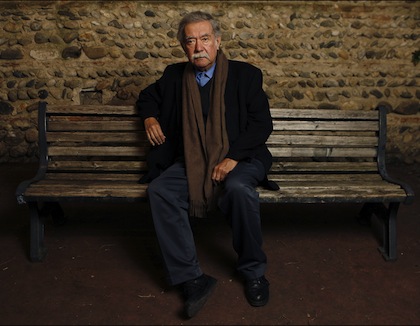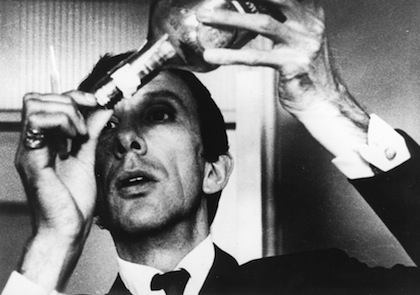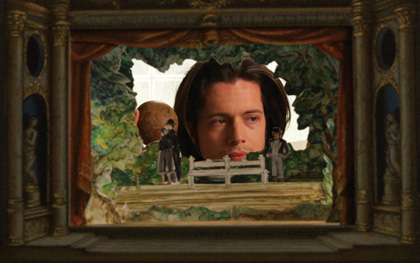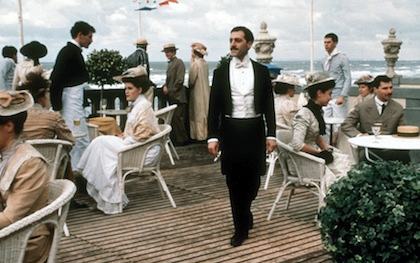Obituary
Raúl Ruiz

Photography by Getty Images
Film director and polymath
25 July 1941 – 19 August 2011
With the death of Raúl Ruiz on Friday 19 August, cinema has lost a dimension – an entirely alternative one, foreign to the familiar laws of film language and practice. We may find ourselves wondering now whether Ruiz ever really existed, or whether his wildly expansive oeuvre was the stuff of dream, an entirely apocryphal career like those of the imaginary writers hypothesised in recent years by his fellow Chilean fabulist Roberto Bolaño.
Sometimes I suspect I may have dreamed some of the Ruiz films I’ve watched. I’m not sure how many of his films I’ve seen – at the last count, something over 30 – but I certainly don’t remember them all in detail. I’ve even come across reviews of his features in the Time Out Film Guide, then realised with surprise that I’d written them myself. But that’s because Ruiz’s films weren’t always conventionally memorable – if ‘memorable’ means that a film leaves an impression because it is coherent and complete. Rather, his creations were often fragmentary, provisional, ephemeral, like dreams that grip and perplex, then confoundingly dissolve when you wake up.
But let’s not mystify his films: they felt all the more authentically dream-like for being manifestly fabricated by a director-puppeteer creating uncanny effects through overt tricks of focus and framing, or by moving actors, props and camera around on castors. Purely as a technician of visual effects, Ruiz expanded the language of cinema; but he also expanded film’s expressive and intellectual palette by freeing it from the commonplaces of character and plot, or of spatial and temporal uniformity.
Ruiz was famously an exile, leaving his native Chile for France in the mid-1970s. But he was also an exile from the worlds of literature and philosophy, an errant man of letters (above all, pre-20th-century letters) carrying his personal imaginative library in his wanderings through the territory of cinema, a domain often indifferent or hostile to literary values – at least, to the sort of arcane literary values that Ruiz celebrated.

Tres tristes tigres
Born in Puerto Montt, Chile, in 1941, Ruiz studied law and theology, but his passion was experimental drama, and he claimed to have written 100 plays as a young man. His first feature, Tres tristes tigres (1968) was as close as he came to naturalism, an ensemble piece that showed the influence of the nouvelle vague and Cassavetes. The Penal Colony (La Colonia penal, 1971) was an early example of Ruiz’s idiosyncratic appropriation of texts – Kafka recast as a blackly satirical take on Latin American politics. The film proved only too prescient of later events in Chile, and Ruiz and his wife Valeria Sarmiento – a director in her own right, and a regular editor of his films – would leave for France just before the Pinochet coup of 1973.
Shot in early 1974, Dialogue of Exiles (Dialogos de Exiliados) directly explored the new condition of Chilean exile. It set the pattern for Ruiz’s phenomenal output over the next decade and a half. His breakthrough film of this period was the eerie The Hypothesis of the Stolen Painting (L’Hypothèse du tableau volé, 1979), shot by Sacha Vierny and based on the writings of Pierre Klossowski. Loosely describable as Ruiz’s own Last Year in Marienbad, it was a sort of metaphysical detective story in the form of a series of paintings recreated as tableaux vivants. The Three Crowns of the Sailor (Les Trois Couronnes du matelot, 1983) – at once sumptuous and spare in its production values – was an uncanny sea story, Ruiz’s ‘Ancient Mariner’ and ‘Flying Dutchman’ combined, with thematic and visual echoes of Orson Welles’s Isak Dinesen adaptation The Immortal Story.
In a phenomenally industrious period that also saw Ruiz working as co-director of the Maison de la Culture in Le Havre, he also made the multilingual Point de fuite (1984), adaptations of Racine, Shakespeare, Arthur Adamov and the Iranian writer Sadegh Hedayat (The Blind Owl/La Chouette aveugle, perhaps Ruiz’s most purely oneiric narrative), as well as an extraordinary fantasia on Treasure Island (1985), less an adaptation than a self-reflexive ‘re-dreaming’ of Stevenson’s novel, with Jean-Pierre Léaud and Martin Landau. Mémoire des apparences (1986) emerged from Ruiz’s stage production of Calderón’s Life is a Dream in Avignon, and merged the Spanish Golden Age metaphysical drama with a cinephile political thriller that drew on Ruiz’s childhood passion for Flash Gordon serials.

Mysteries of Lisbon
An errant director who filmed variously in France, Holland, the US and, repeatedly, Portugal, Ruiz settled down in a sense in the 1990s, reaching an entente with the European mainstream. Three Lives and Only One Death (Trois vies et une seule mort, 1996), exploding the notion of unified character and linear biographic narrative, starred Marcello Mastroianni, and was a confident shot at an approachable yet still wildly eccentric mainstream art film. His apotheosis as a bankable arthouse director came with Time Regained (Le Temps retrouvé, 1999), a subtle engagement with Proust’s themes of memory and metamorphosis.
Ruiz continued to work with bigger budgets and financeable names (Deneuve, Malkovich, Huppert et al), but no one was fooled about his attitude to mainstream narrative values – which wasn’t derisory by any means, just proudly oblique. Shattered Image, a 1998 US production starring Anne Parillaud, is an entertainingly fragmented deconstruction of the erotic thriller. Unlike many experimental filmmakers, Ruiz was passionately committed to both the idea and the activity of storytelling – which meant taking narrative to its farthest limits, to the point at which it both replicates and devours itself. Perhaps the closest cinema has come to the possibilities imagined by Borges’s ‘The Garden of Forking Paths’, the underrated Combat d’amour en songe (2000) is a vertiginous contemplation of narrative as an art of combination; the film is at once Ruiz’s own Saragossa Manuscript and a set of portable preludes to his later Mysteries of Lisbon.

Time Regained
Ruiz began to visit Chile again in the 1990s and recently completed another film there. Last year, Ruiz underwent an operation for liver cancer, but he had delayed the operation in order to film a cherished project with his long-time producer Paolo Branco – Mysteries of Lisbon, a four-hour film and six-hour TV series based on the 19th-century novel by Camilo Castelo Branco. The result is at once one of Ruiz’s straighter works and one of his most distinctive – a flowing, twisting, leisurely river of narratives within narratives, with characters changing identities and passing in and out of each other’s lives in a picaresque flux that is as much Proustian as Balzacian. Executed with sober sumptuousness à la Visconti, the film was released to acclaim in the US in August, and saw Ruiz receiving more admiring publicity than he had since Time Regained. Although not strictly his last film, Mysteries nevertheless stands as a perfect closing testament – a stately meditation on fate, memory and the possibility that our lives may be bewitching labyrinths of fact and fabulation.
To paraphrase one of his titles, Ruiz’s obituary comprises one death, and any number of lives. Tirelessly energetic, he was also in his time an installation artist, a comic-strip scenarist, a fiction writer (including a personal reworking of Treasure Island), an academic (he recently taught a course in film and neurology in Aberdeen), and screenplay collaborator on the films of his wife Valeria Sarmiento. He was also an influential theorist of cinema, writing two volumes of a provocative and complex Poetics of Cinema.
Softly-spoken and modest, Ruiz was a serious and erudite man, driven by intense intellectual curiosity, but also about as ludic a film-maker as there has ever been. In person, he resembled one of the perpetually distracted bewhiskered savants on the polar voyage in Hergé’s The Shooting Star. And he was a polar explorer, in a sense, going to cinema’s farthest reaches and discovering an unsuspected range of the artform’s possibilities – and its impossibilities. He leaves behind not so much a body of work as a vast imaginary continent, still largely unmapped and awaiting exploration.
Mysteries of Lisbon is released in early December
Jonathan Romney
See also
Mexico Rising: Nick James interviews Raúl Ruiz (January 2006)
Time Regained reviewed by Keith Reader (January 2000)
Joseph Losey & Harold Pinter: In search of poshlust times: Nick James on Losey and Pinter's new form of high-culture art film (June 2009)
